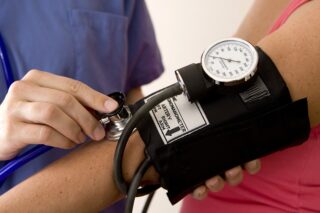
Heart health is now literally at a patient’s fingertips. Measurement of peripheral pulse, or MPP, is a simple and accurate way for a patient, healthcare professional, or caregiver to screen for atrial fibrillation after a stroke, according to new research published in Neurology in July 2014.
Atrial fibrillation means one part of the heart beats out of sync with the rest. This causes an irregular, fluttering pulse in peripheral arteries far away from the heart, especially in the wrist. Symptoms of a-fib include heart sensations such as irregular, thumping, or pounding heartbeats, or feelings. A person with this condition may feel as if his heart is racing, and he may experience chest discomfort or heaviness, fatigue, or lightheadedness.
Pulse Checks May Detect Atrial Fibrillation
Medical professionals measure peripheral pulse in hospitalized stroke patients regularly as part of an initial screening process for a-fib. This regular MPP check often stops when the patient leaves the hospital or rehabilitation center but his risk for recurring stroke continues.
MPP is an easy, non-invasive way to screen for atrial fibrillation, or a-fib, after stroke. About 15 percent of people who have a stroke also have a-fib, according to the National Stroke Association. A-fib is also major risk factor for stroke, so screening for atrial fibrillation after a first stroke can reduce the risk for a second one.
The study recruited 256 patients who had suffered ischemic stroke and their relatives at a stroke rehabilitation center. Researchers used standardized education material to instruct participants in the characteristics of atrial fibrillation, or a-fib, and basic training in how to perform MPP by measuring their pulse at the wrist. Study leaders then asked patients, family members and healthcare providers to perform MPP. The researchers compared the measurements obtained by each group with EKGs to evaluate the accuracy of the readings.
The intent of the study was to determine the diagnostic sensitivity, or accuracy, of MPP when administered by a patient or family member. Researchers wanted to show that patients and their families could learn how to perform MPP themselves as a “first-step” screening tool.
Researchers determined that nine out of ten patients were able to perform a measurement of their peripheral pulse reliably. The study showed that patients and caregivers can be trained to perform MPP consistently in a way that could detect atrial fibrillation and, in turn, reduce the risk for a second stroke.
If you are concerned about how your heart is doing after a stroke, or if your primary care doctor recommends that you see a cardiologist, contact Dr. Dilip Mathew today. Dr. Mathew is Sarasota’s leading electrophysiologist, having performed nearly 3,500 AF ablations in Tampa Bay & the west Florida area since 2004. With two offices to serve you better, Heart Rhythm Consultants can be reached at (941) 210-0950.



